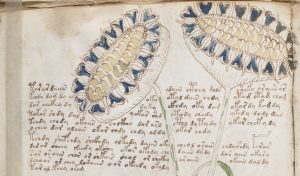Consultancy: The store detectives who didn’t make arrests
A major security provider wanted to know why some of their store detectives were making more arrests than others. Was it a training problem, or a skill problem, or an attitude problem, or something else?
Instead, Gordon trained two of the organisation’s staff in using think-aloud technique and laddering, so they could gather information from the store detectives. This combination of techniques swiftly showed the staff that the detectives were all capable of making plenty of arrests, and that the problem wasn’t ability. It turned out to be whether or not the store managers would back up the detectives if they made an arrest. If the managers wouldn’t back up the detectives, the detectives made their presence known to the would-be shoplifters, who swiftly left, without an arrest being made.
Detecting expert error: Codes, ciphers, and the case of the Voynich Manuscript
A major strand in our work has been finding errors in expert reasoning about difficult problems. As a case study for our approach, Gordon tackled the Voynich Manuscript, a problem that had gone unsolved for over eighty years, despite sustained work by some of the world’s best code breakers. Within weeks, he had found a key faulty assumption in previous reasoning about the problem, and had also found a feasible solution to the previously unsolved problem of how the text in the manuscript could have been produced.

Part of a page from the Voynich Manuscript; image courtesy of the Beinecke Library
Applied research: When lives depend on eliciting accurate requirements
Gordon was working with Neil Maiden on a project involving ways of gathering users’ requirements for safety-critical software systems. Even though the users knew that their lives would depend on the software being based on correct requirements, the users still weren’t saying clearly and specifically what their requirements were. Gordon and Neil realised that the problem lay in how the human brain stores memories and skills; the users not only didn’t state their requirements, they often couldn’t state them, because the knowledge involved was nonverbal or otherwise inaccessible. Gordon and Neil developed the ACRE framework to handle this problem, by mapping different types of memory and skill onto appropriate elicitation methods. The same issues apply to any field that gathers knowledge from human beings, such as market research and the social sciences.
Although the full ACRE framework is complex, its key points can be summed up simply, in terms of what people do, don’t, can’t or won’t tell you, as shown below.

More about elicitation methods
Education research: The good students who wrote badly
Gordon once worked on a course for students doing an MSc after being in the workforce. The students were outstanding in almost every respect, but had one major problem; their written work was getting unexpectedly poor marks. Gordon used think-aloud and laddering to investigate, and discovered that the students’ idea of what constituted good writing contained a major misperception. The students thought that academic writing was dull and cluttered because academics didn’t know how to write interesting text that was easy to read; being tactful, the students didn’t confront the teaching staff over this, but instead wrote their assessed work in what they considered to be a better style. The students hadn’t realised was that academic writing is deliberately impersonal, so researchers can’t manipulate the reader with emotional words, and is deliberately cluttered because it makes heavy use of references and data so the reader can see where the balance of evidence lies. In effect, the students were deliberately leaving out the things that would earn them marks.
Once the students knew the reasons for academic language being different from most other forms of writing, they rapidly adapted, and went on to be an outstanding group.